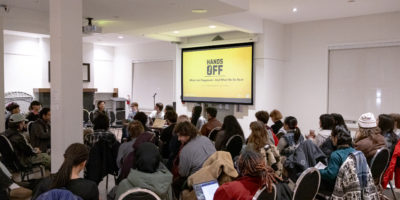By Anika Syeda
Ryerson, it describes itself as a “leader in career-focused education.” With its many faculties, Ryerson can help students attain jobs in both the public and private sectors.
The public sector refers to working for the government or government-owned organizations, and the private sector means working in everything else such as privatized companies.
Kathleen Kellett, the associate dean of the Faculty of Arts oversees 32,302 students, the largest faculty by a margin of thousands. Within the massive faculty of hugely varied disciplines—ranging from philosophy to criminology to international economics—Kellett sees her students entering both the public and private sectors and even moving between them, armed with what she calls “flexible skills.”
“Bear in mind that your skills may be transferable,” she said. “I think there’s a lot of possibilities of movement from one [sector] to the other.”
Kellett corroborated Ryerson’s claim of being a career-focused school, detailing a course offered by the politics program where students go to Queen’s Park and pair up with MPPs as a learning experience. Yet she also sees some of those students —and many others among the thirty-something thousand—veering away from government work and eventually opting to work for private corporations.
How can co-op help business students?
Ted Rogers School of Management is a faculty some students associate with private sector work more than government-related careers. Some, such as fourth-year marketing student Victoria Gimelfarb, feel opportunities in the private sector dominates course content and faculty events.
“They don’t really discuss the opportunity for working in the public sector as much,” said Gimelfarb. “It’s mostly just [different] companies we analyze, that people come in from for networking events, where we see internship opportunities.”
Students such as Gimelfarb may be surprised to hear that TRSM’s co-op program encourages students to seek out work in government and learn that public sector careers are a viable option, not reserved only for arts graduates.
Jessica Kudlats is TRSM’s right-hand in pairing students with co-op opportunities. Kudlats said that many TRSM students entered the school not even knowing that working in the public sector was a viable option for business students. Debunking this myth is part of her job, as strategic partner advisor for the faculty where she exposes students to their potential in government.
“We get a lot of government positions in our co-op program,” she said. “Before [students] graduate, they’re going to get that exposure. Some students will work for a private company and do another work term in the government sector, and they’ll figure out where the best fit is.”
Working for the government has its perks
A marketing student could find their best fit in the ministry of economics, according to Kudlats. “They’re marketing Ontario. They would never think of working in the government for marketing, but someone has to market the country.”
And someone has to conduct aquatic research for the country, also, as dean David Cramb of the Science Faculty discovered. The newly appointed dean found himself in the public sector when, as a grad student, Cramb had worked for the Department of Fisheries and Oceans researching herrings.
He also found that within the science departments in the public sector, an employee could maximize their potential in one field—herrings for example—and easily move onto a related field, such as researching salmon.
TRSM’s Kudlats corroborated this claim, also voicing the ease of movement and job flexibility within a department of government.
“Even if you get into one area and you see somewhere else that is more appealing, you have the flexibility to move within that. It’s a lot easier to make that move. The same thing when you’re working internally, when you’re working at a company, employers would rather not lose you,” added Kudlats.
This comes as good news for science students in environmental studies. Cramb forecasts public sector industry grown in environment-focused departments, due to the government’s recent positive attitude towards addressing climate change.
“Now that the provincial government is actually on board with that, that could mean jobs for students that have environmental savvy through their degrees. That’s just my speculation.”
Stability or money – science students decide
However, Cramb predicts more growth in the private sector than in the public sector for science graduates overall. There are public-sector jobs for science students, and they are fiercely competitive.
“The scarcity of them makes them competitive,” he said. “There certainly is the perception that they’re sweet jobs to have. They would be like jobs for life [with], great pension, the potential to move around in the job and grow within the work.”
While the private sector may not have the reputation of stability, Cramb said they often have better salaries. This is especially the case for computer science students, who make up the Science Faculty’s largest department. According to both Cramb and other studies, computer science students may have no shortage of high-paying work in the private sector after graduation.
Computer science students are aware of how highly valued their degrees are in both sectors. First-year computer science student Nika Dariani, a representative of Ryerson’s Women in Computer Science student group, said “I feel like my degree is very versatile because there are so many different career types available. It’s nice to know that I can test the waters and find out what I like.”
When it comes to personal preference, Dariani said she would like to work for a startup. “I feel like it would be very interesting to work in an environment like that, compared to a big company or for the government. To me, it’s like your ideas are better heard.”
FCAD in the Public Sector
As for public sector work for graduates of the faculty of communication and design, Charles Falzon, the dean of FCAD said the Ontario government has a relationship with Ryerson University that facilitates FCAD graduates to work in the public sector.
“I think there’s quite a breadth of public sector jobs, both within the specific professions that we train people in and beyond,” he said.
Falzon detailed two distinct areas where FCAD students were seeing opportunities for work in the public sector.
“One is in areas of policy and research,” said Falzon. “[Students are] attracted to roles in public policy or research and development and strategy development.”
The second area of growth, Falzon said, is in what he refers to as “service design.”
“This is design applied to public services, whether that is in helping make bureaucracies more efficient or whether it is, which is even more exciting, developing new user experience design. The user now being the citizen who is connecting with the government.”
Falzon said that outside of the public sector, Ryerson was prolific in their connection with the private industries. The media school has relationships with organizations in graphic communications, newspapers, broadcast, and the creative industries.
However, much like Cramb, the dean of FCAD said that he predicts projects greater job creation in the private sector. Specifically, he believes there will be more growth in what he calls “non-traditional private sector” jobs compared to big corporations.
“I think that while there is still a strong appeal to people working in the public sector, I think that the growth is likely to be seen in the private sector.”
Falzon attributes this growth to the current climate of innovation, strategy, and entrepreneurship, claiming that FCAD has a strong entrepreneurial spirit. This is especially characterized by the university’s creative business incubator zones such as the Transmedia Zone, Digital Media Zone, and Design Fabrication Zone.
While he said he does not want to underestimate the effective role FCAD students can have in the public sector, Falzon doesn’t see this as the area of growth right now compared to the non-traditional private sector.
“I think that even the government’s strategy is to be focusing on mid-sized businesses and export and so on, so while there’s still going to be an important role for government jobs, the private sector is set for growth.”
Flexible and Adaptable (and employable)
While projected growth between the private and public sectors differ from faculty to faculty, Falzon agreed with Kellett’s original statement that many skills obtained in the university may be transferable skills.
All four representatives of the four faculties interviewed agreed on having a versatile and flexible skill set would mean students can find work in both the public sector and the private sector, and even move between the two.













Leave a Reply